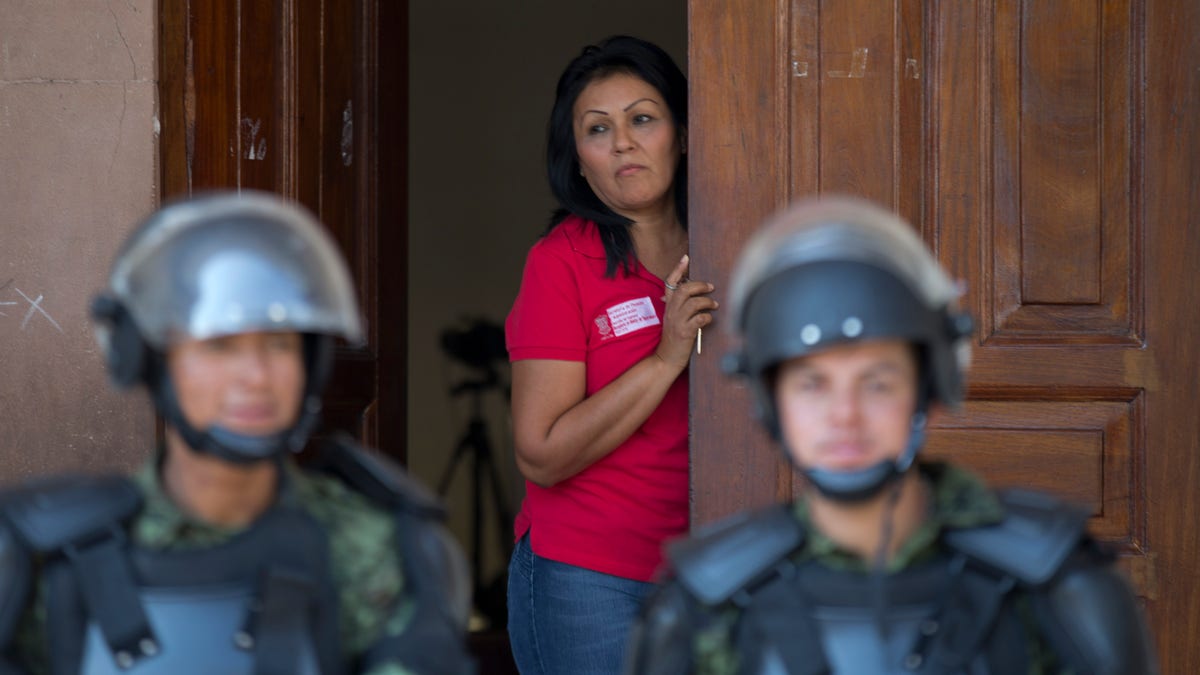
A city employee looks out from a City Hall Hall doorway in Apatzingan, Mexico, Tuesday, Jan. 14, 2014. (AP)
Mexican drug cartels are notoriously powerful and their impact is far-reaching. Street violence and turf battles in the U.S. can be traced often to drugs from Mexico. Court cases indicate that drug cartels have even dispatched their own agents to some U.S. cities to have a direct hand in the drug market. The cartels' influence can be felt close to home as their penetration intensifies and related violence increases.
The fight against the cartels in Mexico has been intricately intertwined with the U.S. The Mexican government has asked the U.S. to step up its effort to combat the southward flow of weapons and money to drug trafficking groups and reduce its internal demand for illicit narcotics. The U.S. has waged a war on drugs since President Nixon and offered financial resources, technology, equipment, and training to Mexican forces for this purpose. The drug war has cost the U.S. over a trillion dollars, but the end to this war is nowhere in sight.
Clearly a long road is still ahead for purging official corruption. But the vision for a clean police and political system is clear and the resolve to rid the system of corruption is strong.
While the challenge is complex, as various issues contribute to organized crime, one obstacle stands out, that is, corruption of police and government officials. Over several decades, the cartels had bribed police as well as politicians, who in turn would protect the cartels. Good officers fighting drug traffickers have been killed by their fellow corrupt officers working for the cartels. There is no doubt that corruption undermines the war on drugs. Police corruption is endemic and is at the heart of organized crime in many communities in Mexico.
Under President Felipe Calderón, tackling corruption in the police and political system took center stage. President Enrique Peña Nieto has continued to rein in official corruption. Scores of police officers and public officials have been arrested. President Calderón also reformed the Federal police force to make it cleaner and President Peña Nieto has continued the overhaul of the police. New Federal officers now have to pass double vetting and background checks. Under the current administration, all contacts for U.S. law enforcement have been streamlined and must go through the Ministry of Interior, the agency that controls security and domestic policy. The central political and bureaucratic control is geared toward better coordination of anti-drug efforts.
The Federal police have been reorganized into five regional commands in order to fight drug cartels more effectively. They coordinate their operations with Federal prosecutors, the army, marine corps, state prosecutors, and state police commanders. The use of the military to tackle organized crime has been a policy under both President Calderón and President Peña Nieto. Several municipalities have been put under the control of the Mexican armed forces recently in the Pacific states of Michoacán and Guerrero. The Federal police have replaced entire police forces also in certain towns and areas because of concern of their involvement in drug trafficking.
The focal concern of corruption in combating organized crime is further demonstrated by a recent conference on police internal affairs sponsored by the Federal police in Los Cabos. With 37 international experts on police corruption and over 500 top police officials mostly from Mexico and other South American countries, the conference deliberated a range of issues on police corruption, including internal control and management, investigation and surveillance, institutional reform and prevention, codes of ethics and conduct, role of society in fighting corruption, human rights abuse, and police-community relations.
While it is too early to tell what impact these efforts will have on drug-related violence, official data from Mexico points to a decrease in homicides in 2013. The rates of extortions and kidnappings, however, are up.
Clearly a long road is still ahead for purging official corruption. But the vision for a clean police and political system is clear and the resolve to rid the system of corruption is strong. A determined and effective policy to clean up corruption, impunity, and organized crime’s influence on Mexican police and political system will eventually reduce the power of organized crime groups, enhance the rule of law, and lead to a stronger, more civil society in both Mexico and the United States.
